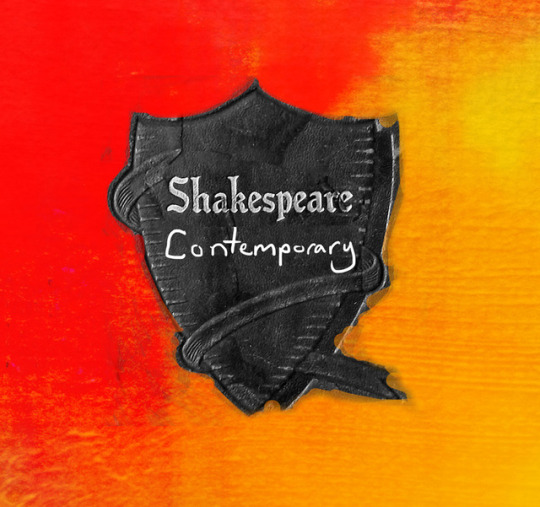Photo

0 notes
Photo

Shakespeare Contemporary
William Shakespeare is not only a groundbreaking author he is also a creative mind who contributed over 2000 words, phrases and sayings to the English language. His plays often provide us with the earliest use of many phrases and most of them are still in daily use.
The exhibition contains illustration paintings of 10 idioms / phrases invented or coined by Shakespeare.
Designed by: Emek Kalfa
Creative concept / Curated by: Ilkay Yıldız
0 notes
Photo

Kill with Kindness
Bu deyimin 1500′lü yıllarda ortaya çıktığı ve “Kill with kindness as fond apes do their young” (Aşırı sevgi dolu maymunların yavrularına yaptığı gibi sevgiyle öldürmek) deyiminden türediği biliniyor.
Deyim, W. Shakespeare tarafından Türkçe’ye “Hırçın Kız” olarak çevrilen “The Taming of The Shrew” (1594) adlı oyunda kullanılmıştır.
This expression is originated in mid 1500s. as “Kill with kindness as fond apes do their young” - presumably crushing them to death in a hug.
Coined by W. Shakespeare, this idiom appears in The Taming of The Shrew (1594)
The Taming of The Shrew, Act IV, Scene I
“This is a way to kill a wife with kindness;
And thus I’ll curb her mad and headstrong humour”
Deyimin Türkçe karşılığı: Ayı yavrusunu severken öldürürmüş.
1 note
·
View note
Photo

Fair Play
Bu deyim, ilk kez W. Shakespeare’in Türkçe’ye “Fırtına” olarak çevrilen “The Tempest” (1611) ve King John (1623) adlı oyunlarında kullanılmıştır.
Invented or coined by W. Shakespeare, this idiom appears in The Tempest (1611) and King John. (1623)
The Tempest, Act V, Scene I
“Yes for a score of kingdoms you should wrangle
And I would call it, fair play”
King John, Act V, Scene II
“According to the fair play of the world, let me have audience”
Deyimin Türkçe karşılığı: Centilmenlik
2 notes
·
View notes
Photo

Too Much of a Good Thing
Bu deyim, W. Shakespeare’in Türkçe’ye “Nasıl Hoşunuza Gidiyorsa” olarak çevrilen “As You Like It” (1603) adlı oyununda ilk kez kullanılmıştır.
Invented or coined by W. Shakespeare, this idiom first appears in As You Like It. (1603)
As You Like It, Act IV, Scene I
“Why then, can one desire too much of a good thing:
Come sister, you shall be the priest, and marry us.
Give me your hand Orlando: What do you say sister?”
Deyimin Türkçe karşılığı: (Azı karar) Çoğu zarar.
0 notes
Photo

Love is Blind
Bu deyim ilk kez orta çağ yazarlarından G. Chaucer’ın The Canterbury Tales (1405) eserinde yer alan Merchant’s Tale (Tacirin Hikayesi) adlı hikayede kullanılmıştır.
Bugün kullanılan haline W. Shakespeare tarafından getirilmiş ve Türkçe’ye “Venedik Taciri” olarak çevrilen “The Merchant of Venice” (1605) adlı oyunda kullanılmıştır.
This expression is first found in G. Chaucer’s Merchant’s Tale from The Canterbury Tales. (1405)
Coined and updated by W. Shakespeare, this idiom appears in The Merchant of Venice. (1605)
The Merchant of Venice, Act II, Scene VI
“But love is blind and lovers cannot see
The pretty follies that themselves commit...”
Deyimin Türkçe karşılığı: Aşkın gözü kördür.
0 notes
Photo

Laughing Stock
Bu deyimin, 16. yüzyılda insanları cezalandırmak, toplum önünde küçük düşürmek için boyunlarının, kollarının ve ayaklarının hareket edemeyeceği şekilde kilitlendiği işkence aleti “stock” kelimesinden türediği bilinmektedir.
W. Shakespeare tarafından ilk kez, Türkçe’ye “Windsor’un Şen Kadınları” olarak çevrilen “The Merry Wives of Windsor” (1602) adlı oyunda kullanılmıştır.
This idiom originates in the 16th century. The age of the phrase often linked with the practice of putting people into stocks (similar to the pillory) as a punishment. The stocks were a means of punishment in use at the time the phrase was coined by which people were tortured or ridiculed.
Coined by W. Shakespeare, this idiom appears in The Merry Wives of Windsor. (1602)
The Merry Wives of Windsor, Act III, Scene I
“Pray you let us not be laughing - stocks to other men’s humors...”
Deyimin Türkçe karşılığı: Alay konusu olmuş kişi, maskara
0 notes
Photo

(It’s all) Greek to Me
Bu deyimin, Latince “Graecum est; non legitur” (bu Yunanca, o yüzden okunamaz) deyiminin doğrudan çevirisi olabileceği düşünülmektedir.
İngilizce olarak ilk kez W. Shakespeare tarafından Julius Caesar (1599) adlı oyunda kullanılmıştır.
It may have been a direct translation of a similar phrase in Latin: “Graecum est; non legitur.” (It’s Greek therefore it cannot be read)
Coined by W. Shakespeare, this idiom first appears in Julius Caesar. (1599)
Julius Caesar, Act I, Scene II
“Nay, an I tell you that, I’ll ne’er look you i’ the face again:
but those that understood him smiled at one another and shook their heads;
but, for mine own part, it was Greek to me.
Deyimin Türkçe karşılığı:
Anladıysam Arap olayım. Fransız kalmak.
Greek sentence used in the painting:
These seem to me gobbledygook.
Bu (yazılan/konuşulan) bana anlamsız görünüyor.
Deyim üzerine kısa bir not:
Bu deyimin birçok dilde benzer karşılıkları bulunuyor. Çoğu dil, kendilerine en uzak / yabancı alfabe ya da yazı dizgesine gönderme yapan versiyonlarına sahip.
Örneğin; Bulgarca, Macarca, Arapça ve İbranice başta olmak üzere birçok dilde bu deyimin karşılığı “Çince mi konuşuyorsun?”, Makedonca, Sırpça ve Slovakça’da “Bu konuştuğun bana İspanyolca gibi geliyor”, Venedikçe’de (Veneto bölgesinde konuşulan Roman dili) “Anlamıyorum, Türkçe mi konuşuyorsun?” gibi versiyonlarına rastlamak mümkün.
A short note on the phrase:
Different languages have similar formulations. Many have picked the point of reference to be a foreign language with another alphabet or writing system.
For example; “It is like you are talking in Chinese” in Bulgarian, Hungarian, Arabic, Hebrew and many other languages; or “That is Spanish village to me” in Macedonian, Serbian and Slovak; or “To me this is Turkish” in Venetian. (A Romance language spoken mostly in Veneto region.)
0 notes
Photo

Faint Hearted
Bu deyim, W. Shakespeare’in Henry VI (1592) adlı oyununda ilk kez kullanılmıştır.
Invented or coined by W. Shakespeare, this idiom first appears in Henry VI. (1592)
Henry VI Part I, Act I, Scene III
“Faint-hearted Woodvile, prizest him ‘fore me?
Arrogant Winchester, that haughty prelate whom Henry, our late sovereign, ne’er could brook?
Thou art no friend to God or to the King.
Open the gates, or I’ll shut thee out shortly”
Deyimin Türkçe karşılığı: Yüreksiz, korkak.
0 notes
Photo

Heart of Gold
Bu deyim, W. Shakespeare’in Henry V (1600) adlı oyununda ilk kez kullanılmıştır.
Invented or coined by W. Shakespeare, this idiom first appears in Henry V. (1600)
Henry V, Act IV, Scene I
“The king’s a bawcock, and a heart of gold,
A lad of life, and imp of fame;
Of parents good, of fist most valiant”
Deyimin Türkçe karşılığı: Altın kalpli.
0 notes
Photo

Catch a Cold
Bu deyim, W. Shakespeare’in “Cymbeline” (1623) adlı oyununda ilk kez kullanılmıştır.
Invented or coined by W. Shakespeare, this idiom first appears in Cymbeline. (1623)
Cymbeline, Act I, Scene IV
“Your hand; a covenant: we will have these things set
down by lawful counsel, and straight away of Britain,
less the bargain should catch cold and starve: I will fetch my gold and have our two wagers recorded.”
Deyimin Türkçe karşılığı: Soğuk algınlığı, şifayı kapmak.
0 notes
Photo

Break the Ice
Bu deyim, W. Shakespeare’in Türkçe’ye “Hırçın Kız” olarak çevrilen “The Taming of The Shrew” (1594) adlı oyununda ilk kez kullanılmıştır.
Invented or coined by W. Shakespeare, this idiom first appears in The Taming of The Shrew. (1594)
The Taming of The Shrew, Act I, Scene II
“If it be so, sir, that you are the man
Must stead us all and me amongst the rest
And if you break the ice and do this feat,
Achieve the elder, set the younger free”
Deyimin Türkçe karşılığı: Buzları eritmek
1 note
·
View note